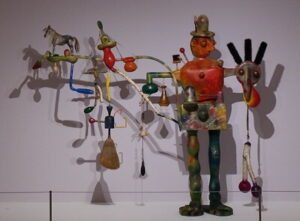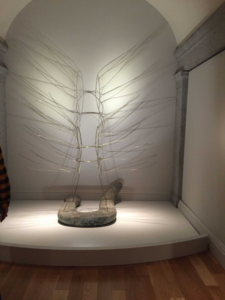It’s been awhile since we’ve done an ekphrastic poem — a poem based on or inspired by a piece of art — so here we go. We had two images to choose from — the first being El Hombre Grande (a mixed-media piece by Roy de Forest, 1989, photo by Tanita Davis) and the second, Spider Dress (a brass wire sculpture designed by Isamu Noguchi in 1946 for Martha Graham dance productions, photo by Sara Lewis Holmes). As you can see, they’re both quite evocative!


I ended up choosing Spider Dress because it begged and embodied a story, even before I discovered it really was designed for the character of Medea in Graham’s performance of Cave of the Heart. Also, feeling like I needed a little more support, I wrote a tritina, a ten-line poem with repeating words that is almost like a mini-sestina. I wished, actually, that I’d chosen other words as my repeating ones but time crept on me so it is what it is. Enjoy.
Medea, Caged
Liz Garton Scanlon
Anchored fast to earth (with tattered wings!)
a mesh of expectations make the cage
from which I watch days set and set and rise
until I warm and come alive, like yeast I rise,
wrench wide my ribs, the fingerlings of wings.
I leave behind this carapace, this cage,
and push from earth to sun, its beams a cage
(another one!) that burns me bare, lets truth arise:
there’s no escape, by foot nor feathered wing –
the wing’s a myth, the heart’s a cage we rise each day within.
You can find my pals’ poems here:
Kelly
Tricia
Sara
Laura
Tanita
And Poetry Friday is at Michelle Kogan’s this week!
Stay well, everyone.

Powerful poem response to Noguchi’s Spider Dress. Medea even in her revenge, seems trapped forever from these lines and your closing line,
“its beams a cage
(another one!) that burns me bare, lets truth arise:
there’s no escape, by foot nor feathered wing –”
You worked the tritina form so masterfully, the reweaving of the words fit well. Thanks for your poem and the link!
So Sara at the end of your poem, I felt myself sigh. there are such powerful images in your poem: the rising of yeast, a cage, and then your ending! This is so reflective. Thank you for sharing your tritina, a format I never tried.
Oh! I just love this one.
Your struggle with the form has produced beauty. The images are searing, and you gave me goosebumps with that last line. I feel like I could read this again and again.
Liz, beautiful poem. I like the tritina, which is new for me. You chose a perfectly evocative form and powerful word choice for an evocative artwork. I will add the tritina to my list of poems to try. Thank you for sharing. Laura wrote a very different poem this week about the same art work, which is always magical for me to see.
So many good things to say about this poem! Your vocabulary is the first to strike me: tattered, mesh, wrench wide… I need to study this for more, but mainly I want to say thanks… wonderful.
wrench wide my ribs, the fingerlings of wings.
I leave behind this carapace, this cage,
Oooh — that is just stunning. This is so powerful, and I love that you feel it unfinished and not quite right, and yet … and yet… it’s done its job and pushed me out into the clear air, flying.
Very sobering and powerful poem to think about. “The wing’s a myth, the heart’s a cage.” Still we try to rise everyday.
Wow! This poem knocks me out. So many amazing words, but I think the best is expectations. And that last line! Swoon…
Liz, this is gorgeous. That final line made me catch my breath.